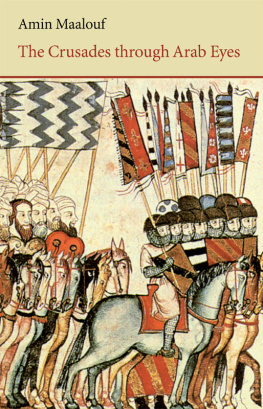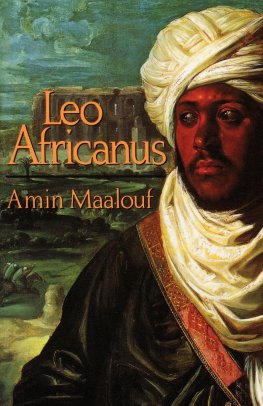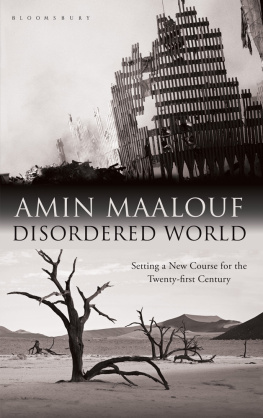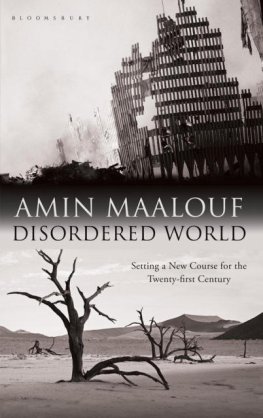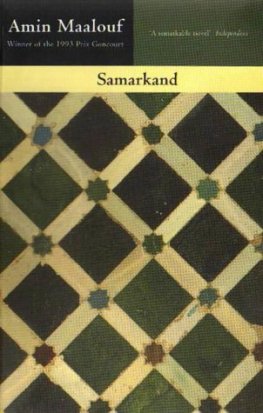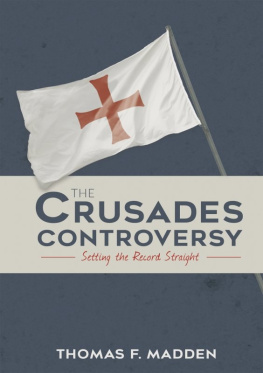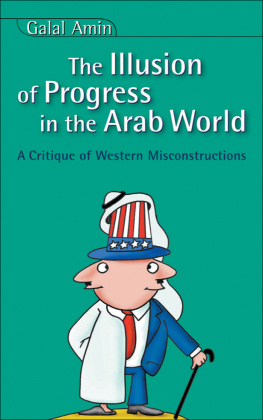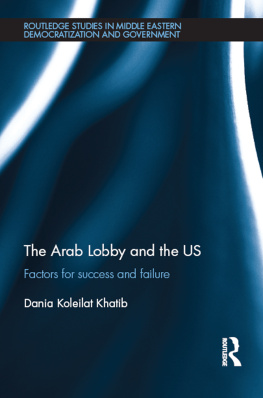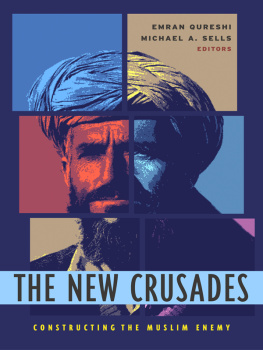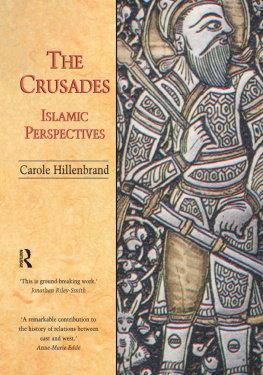Amin Maalouf
The Crusades
through Arab Eyes
Translated from the French by
Jon Rothschild
Contents
Translators Note
Arabic words and names in this book have been transliterated according to a system that allows those who know the Arabic alphabet to reconstruct the original spelling. Readers curious about the pronunciation of these names and words can refer to the Note on Pronunciation at the back of the book. Others will not miss much if they simply ignore the dots and bars of the transliteration and pronounce the words as if they were English. Where a name or word has a standard English form (like Saladin), it has been used. The glossary gives brief definitions of all the Arabic words that occur in the book, whether they have been Anglicized or not. The intent of the glossary is not to provide scholarly descriptions of the terms, but to help in achieving one of the authors main goals: to make his book intelligible to those who have no specialist knowledge of Arab history.
To Andre
Foreword
The basic idea of this book is simple: to tell the story of the Crusades as they were seen, lived, and recorded on the other sidein other words, in the Arab camp. Its content is based almost exclusively on the testimony of contemporary Arab historians and chroniclers.
These latter spoke not of Crusades, but of Frankish wars, or the Frankish invasions. The word designating the Franks was transcribed in many ways, according to region, author, and period. In the various chronicles, we find Faranj, Faranjat, Ifranj, Ifranjat, and other variants. For the sake of consistency, I have chosen to use the briefest form, Franj, a word which is used in colloquial Arabic even today to designate Westerners, and the French in particular.
I was concerned not to burden my narrative with the many bibliographical, historical, or other notes that are necessary in a work of this kind, and I have therefore grouped them all together at the back of the book, where they are arranged by chapter. Those who want to know more can usefully read them, but they are by no means indispensable to an understanding of the story, which is meant to be accessible to all. Rather than offer yet another history book, I have sought to write, from a hitherto neglected point of view, what might be called the true-life novel of the Crusades, of those two centuries of turmoil that shaped the West and the Arab world alike, and that affect relations between them even today.
Prologue
Baghdad, August 1099.
Wearing no turban, his head shaved as a sign of mourning, the venerable q Ab aad al-arawi burst with a loud cry into the spacious dwn of the caliph al-Mustahir Billh, a throng of companions, young and old, trailing in his wake. Noisily assenting to his every word, they, like him, offered the chilling spectacle of long beards and shaven skulls. A few of the court dignitaries tried to calm him, but al-arawi swept them aside with brusque disdain, strode resolutely to the centre of the hall, and then, with the searing eloquence of a seasoned preacher declaiming from his pulpit, proceeded to lecture all those present, without regard to rank.
How dare you slumber in the shade of complacent safety, he began, leading lives as frivolous as garden flowers, while your brothers in Syria have no dwelling place save the saddles of camels and the bellies of vultures? Blood has been spilled! Beautiful young girls have been shamed, and must now hide their sweet faces in their hands! Shall the valorous Arabs resign themselves to insult, and the valiant Persians accept dishonour?
It was a speech that brought tears to many an eye and moved mens hearts, the Arab chroniclers would later write. The entire audience broke out in wails and lamentations. But al-arawi had not come to elicit sobs.
Mans meanest weapon, he shouted, is to shed tears when rapiers stir the coals of war.
If he had made this arduous trip from Damascus to Baghdad, three long summer weeks under the merciless sun of the Syrian desert, it was not to plead for pity but to alert Islams highest authorities to the calamity that had just befallen the faithful, and to implore them to intervene without delay to halt the carnage. Never have the Muslims been so humiliated, al-arawi repeated, never have their lands been so savagely devastated. All the people travelling with him had fled from towns sacked by the invaders; among them were some of the few survivors of Jerusalem. He had brought them along so that they could relate, in their own words, the tragedy they had suffered just one month earlier.
The Franj had taken the holy city on Friday, the twenty-second day of the month of Shabn, in the year of the Hegira 492, or 15 July 1099, after a forty-day siege. The exiles still trembled when they spoke of the fall of the city: they stared into space as though they could still see the fair-haired and heavily armoured warriors spilling through the streets, swords in hand, slaughtering men, women, and children, plundering houses, sacking mosques.
Two days later, when the killing stopped, not a single Muslim was left alive within the city walls. Some had taken advantage of the chaos to slip away, escaping through gates battered down by the attackers. Thousands of others lay in pools of blood on the doorsteps of their homes or alongside the mosques. Among them were many imms, ulam, and Sufi ascetics who had forsaken their countries of origin for a life of pious retreat in these holy places. The last survivors were forced to perform the worst tasks: to heave the bodies of their own relatives, to dump them in vacant, unmarked lots, and then to set them alight, before being themselves massacred or sold into slavery.
The fate of the Jews of Jerusalem was no less atrocious. During the first hours of battle, some participated in the defence of their quarter, situated on the northern edge of the city. But when that part of the city walls overhanging their homes collapsed and the blond knights began to pour through the streets, the Jews panicked. Re-enacting an immemorial rite, the entire community gathered in the main synagogue to pray. The Franj barricaded all the exits and stacked all the bundles of wood they could find in a ring around the building. The temple was then put to the torch. Those who managed to escape were massacred in the neighbouring alleyways. The rest were burned alive.
A few days after the tragedy, the first refugees from Palestine arrived in Damascus, carrying with them, with infinite care, the Koran of Uthmn, one of the oldest existing copies of the holy book. Soon afterwards the survivors of Jerusalem duly approached the Syrian capital. When they glimpsed the distant outlines of the three minarets of the Umayyad mosque looming up from its square courtyard, they unrolled their prayer rugs and bowed to give thanks to the Almighty for having thus prolonged their lives, which they had thought were over. Ab aad al-arawi, grand q of Damascus, welcomed the refugees with kindness. This magistrate, of Afghan origin, was the citys most respected personality, and he offered the Palestinians both advice and comfort. He told them that a Muslim need not be ashamed of being forced to flee from his home. Was not Islams first refugee the Prophet Muammad himself, who had to leave Mecca, his native city, whose population was hostile to him, to seek refuge in Medina, where the new religion had been more warmly received? And was it not from his place of exile that he launched the holy war, the jihd, to free his country of idolatry? The refugees must therefore consider themselves

